Unfortunately, I have to begin this year's Oscar preview with a sad note (at least, a sad note for me): for the first time since 2008, I was unable to see all of the nominees in the major categories. A Separation didn't open in time for me to include it in this preview, and though I hope it will open around here this weekend - it is on one theater's schedule, but only as "coming soon" - I don't necessarily think it will. So please forgive it's absence from this list today; I can't judge it 'till I see it, you know.
As for how Oscarpalooza works: each day this week I'll roll out another major category, culminating in Best Picture on Sunday morning followed by the live-blog on Sunday night. Won't you join us for all the Oscar love this week?
BEST ADAPTED SCREENPLAY
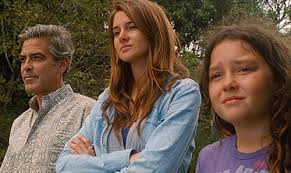
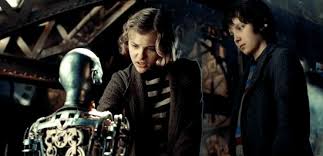

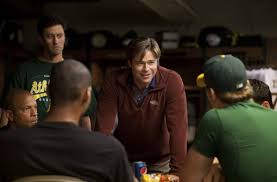



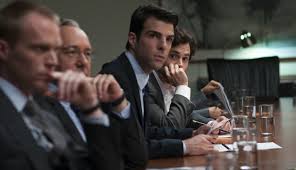
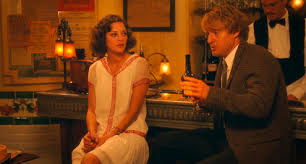
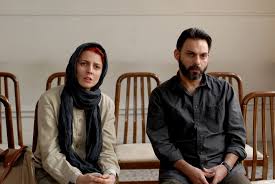
As for how Oscarpalooza works: each day this week I'll roll out another major category, culminating in Best Picture on Sunday morning followed by the live-blog on Sunday night. Won't you join us for all the Oscar love this week?
BEST ADAPTED SCREENPLAY
The Descendants; screenplay by Alexander Payne and Nat Faxon & Jim Rash (based on the novel by Kaui Hart Hemmings)
The Descendants has won a startling number of awards for its screenplay, and is the easy frontrunner to win this prize come Oscar night. And for good reason: the script draws out these characters very well, and it manages to bring a lot of different plots together in a way that feels organic. But without Payne's direction and the genuinely terrific ensemble, this is some highly overwrought work, with scenes that feel way too melodramatic that you can see how, in lesser hands, this could have been a disaster. It's a good screenplay, but I wouldn't call it the best, especially not of these five.
Hugo;
screenplay by John Logan (based on the graphic novel The Invention of Hugo Cabret by Brian Selznick)
Hugo is another film who's screenplay I find problematic. When you consider that he was working from a graphic novel that was heavy on the illustrations, this is quite a feat. But what bothered me the most about the film was the way that it seemed disinterested in the story it was telling and more concerned with teaching the importance of film preservation. As such, the script feels like it's had those moments jammed into it, while the story falls to the wayside. The dialogue, too, is a bit heavy-handed at times, which makes the whole thing feel even more forced. It's not bad, but it still feels like a disappointment.
The Ides of March; screenplay by George Clooney & Grant Heslov and Beau Willimon (based on the play Farragut North by Beau Willimon)
It's no secret that I really loved this movie, and I'm still disappointed that this was the film's only nomination. But it's greatness began here at the script level: richly drawn characters, superb drama, and all the various twists and turns and betrayals that make a great political thriller. Clooney and Heslov were wise to bring aboard original playwright Willimon, and they did a terrific job at making the whole thing feel cinematic. This was a case of adaptation gone terrifically right.
Moneyball; screenplay by Steven Zaillian and Aaron Sorkin, story by Stan Chervin (based on the nonfiction book by Michael Lewis)
Now here's an example of how adaptation is really done: Zaillian and Sorkin took a dry, statistic-driven book about baseball sabermetrics - a process in which you mathematically build a championship baseball team out of bargain-bin players - and turned it into a soulful rumination on the tenacity of the human spirit and the perennial underdogs. The film never drags, the dialogue pops, and the characters are nothing short of fully human. This is top notch work from two of Hollywood's best working writers. This could prove to be a spoiler if the Academy doesn't go nuts for The Descendants or Hugo.
Tinker Tailor Soldier Spy; screenplay by Bridget O'Connor & Peter Straughan (based on the novel by John Le Carre)
A taut, deliciously complex spy thriller, this is the sort of work that can be difficult to pull off - and Straughan and the late O'Connor pull it off magnificently. Tinker Tailor is coming from great source material, and the script keeps the Cold War spirit alive while smartly never making an character the obvious culprit by making every character seem like the obvious culprit. As filtered through the rich-but-reserved George Smiley, the whole screenplay crackles with the feeling that so much is being unsaid. If not for The Descendants, Hugo, and Moneyball, this would easily be the frontrunner in this category.
My personal ballot:
1. The Ides of March; screenplay by George Clooney & Grant Heslov and Beau Willimon
2. Moneyball; screenplay by Steven Zaillian and Aaron Sorkin, story by Stan Chervin
3. Tinker Tailor Soldier Spy; screenplay by Bridget O'Connor & Peter Straughan
4. The Descendants; screenplay by Alexander Payne and Nat Faxon & Jim Rash
5. Hugo; screenplay by John Logan
Predicted winner: The Descendants
Spoiler: Moneyball
Dark Horse: Tinker Tailor Soldier Spy
BEST ORIGINAL SCREENPLAY
The Artist; written by Michel Hazanavicius
Can you really nominate a silent film for writing? Of course you can; that's perhaps one of the dumbest arguments I've heard this Oscar season (and I've heard my fair share). The story structure here is nothing new - just watch any of the A Star is Born films, but particularly the Judy Garland version, because it's the best - but there's just enough pathos in it to set it apart. Still, there's no denying that the film's strengths aren't coming from the script, but from Hazanavicius' direction and the two-front charm offensive from stars Jean Dujardin and Berenice Bejo. It's a strong contender to win nonetheless.
Bridesmaids; written by Annie Mumolo & Kristen Wiig
The Oscars are usually good for recognizing comedy here, and they proved themselves to be especially open this year, with three films that can be classified as comedies (though sadly, Young Adult is not one of them). Bridesmaids in particular is a fantastic inclusion in that it really sets itself apart from many R-rated comedies these days: it shines with deeply-flawed but never-short-of-human characters, each one with a real personality and not a broad caricature. And it captures pre-wedding hysteria perhaps better than most films ever have. Best of all, its genuinely funny while not being afraid to address issues such as depression and anxiety. That's a tall order for a crowd-pleasing comedy, but Mumolo and Wiig found a way to make it all happen seamlessly. The only thing that will keep it from winning Sunday night is that the film itself is not "Oscary" enough to be considered.
Margin Call; written by JC Chandor
Is there any writer/director as lucky as Chandor this year? He assembled a phenomenal cast for this film, with everyone from Jeremy Irons to Zachary Quinto to Stanley Tucci to Kevin Spacey involved. Then there's his tight, informative script, which is extremely heavy on the dialogue and financial jargon but also accessible to layman audiences who don't know prime from subprime mortgages. He's crafted a brilliant financial thriller about the 2008 collapse, with a sturdy assuredness that seems supernatural at times, and still manages to find some witty quips ("Speak to me as if I was a small child or a golden retriever."). Oh, and did I mention this is his first film? Many consider his nomination surprising, so don't expect a win, but what an introduction.
Midnight in Paris; written by Woody Allen
Is Midnight in Paris one of Allen's best films? That's debatable, but it's certainly one of his finest in many years. The film has been derided as "slight," but I don't necessarily think that's true: while it doesn't go for the deep pathos of, say, Hannah and Her Sisters, the film does explore the merits and shortcomings of nostalgia, reminding us that we never think of ourselves as living in a "golden age" though the next generation will likely romanticize it (for example, just look at my generation's love of the '90s, which, if we're really honest with ourselves, weren't all that great). Allen does continue to struggle with some of the characterization problems he's suffered through the last decade with (see: Inez), but he also brings to life vibrant characters in Ernest Hemingway and Zelda Fitzgerald, among others. Allen's the frontrunner here, and its certainly commendable work.
A Separation; written by Asghar Farhadi
One of the things I love about the Original Screenplay category is that it is much more willing to nominate foreign-language films than other categories (besides, obviously, Foreign Language Film). Though the category is missing a few of my favorites from last year (Beginners, Martha Marcy May Marlene, Weekend, Young Adult), it still made me ridiculously happy to see Farhadi recognized here. And here's a crazy theory: he may just win. With the pressure on Iran, the foreign-film body may choose to honor something other than A Separation in Foreign Language Film (that Oscar, you see, goes to the nation of origin, not the producers/director; therefore, if A Separation is recognized, the Oscar goes to Iran). If that is the case, then voters may choose to recognize the man who made the film - one of the year's best reviewed - rather than the nation it came from. You heard it here first.
My personal ballot (for the four I've seen - an updated ballot will appear when I see A Separation):
1. Bridesmaids; written by Annie Mumolo & Kristen Wiig
2. Midnight in Paris; written by Woody Allen
3. Margin Call; written by JC Chandor
4. The Artist; written by Michel Hazanvicius
Predicted winner: Midnight in Paris
Spoiler: The Artist
Dark Horse: A Separation
Comments
Without a doubt, I think A Separation wins the best screenplay without competition:)
Thanks so much!